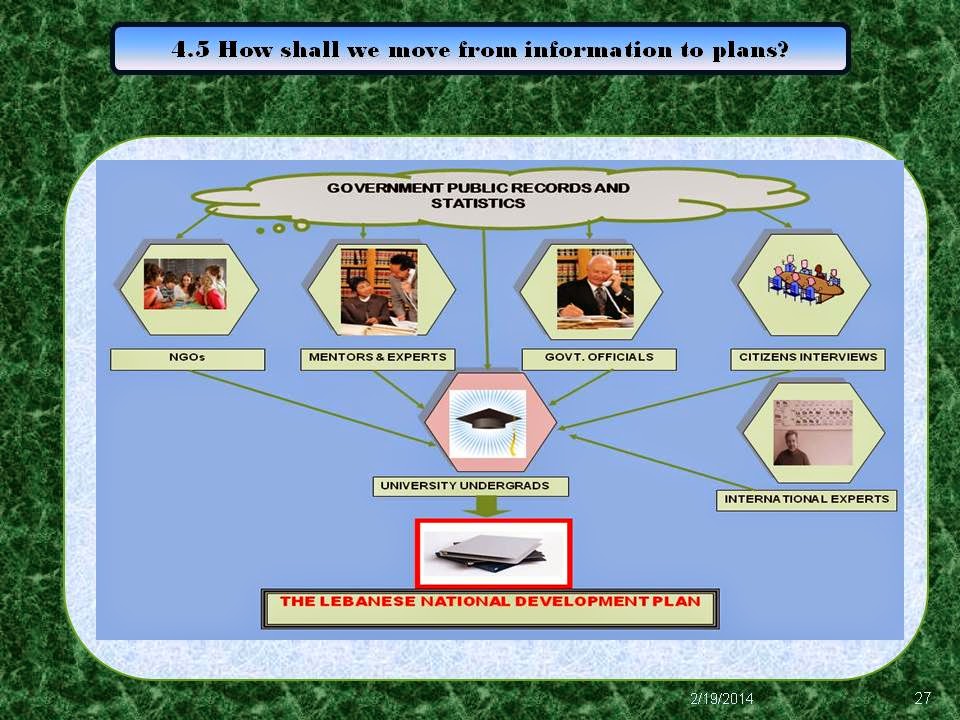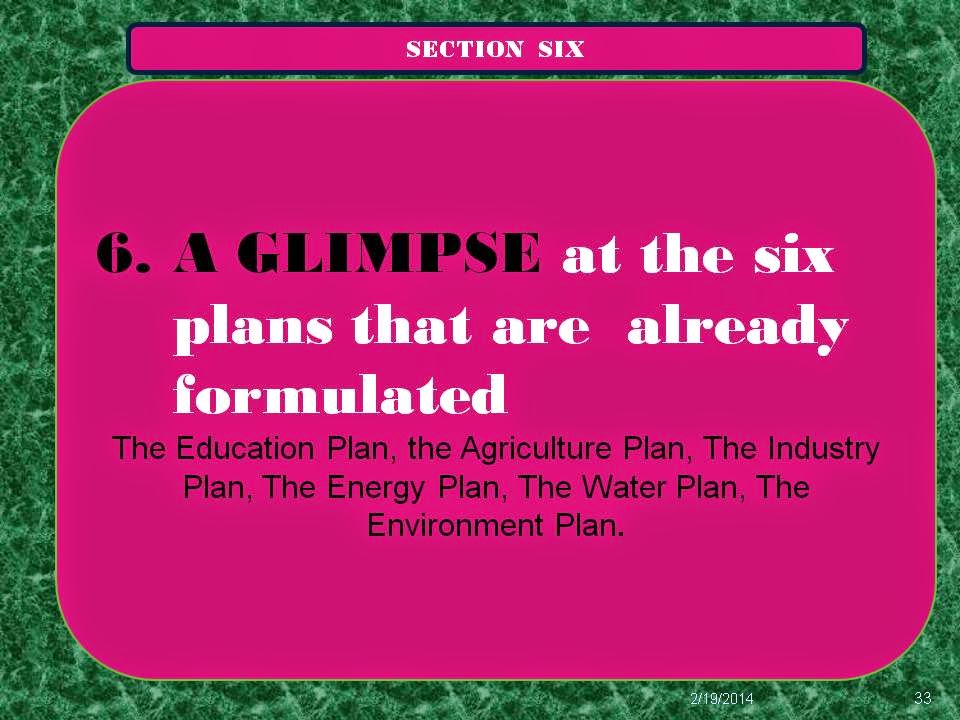L.N.D.P. The Lebanese National Development Plan
A note to the Readers
You will find below our latest attempt at putting together the elements of a Lebanese National Development Plan (L.N.D.P.).
Our NGO, CPI The Lebanese Center for Public Information has worked on this project since 2006, unceasingly amending and updating the information which we have used for that purpose.
The following is the result of nine years of arduous work. We hope that the readers will be indulgent with us if any errors or misconceptions are discovered. We shall be grateful if they will openly point them out in the "comments" section, and we assure them that we shall do our best to give them our full attention.
Aw we have often signaled it in these pages, the L.N.D.P. should not be the product or the property of a single individual, a single organization, or even a National Institution. The L.N.D.P. belongs to and is conceived for the benefit of the four and a half million Lebanese citizens who make up the population of this country, as well as the millions of Lebanese of the Diaspora living and residing abroad. Every single members of this community is entitled to, and is strongly requested to, bring his/her contribution to this vital document and, thus, claim partial ownership.
For the sake of clarity, the Project is presented in the form of Power Point slides, each one dealing with a specific subject. Broadly speaking the project attempts to answer the following questions:
- WHAT are the problems that we face in this country?
- WHAT is the L.N.D.P. and WHY do we need it?
- HOW to build it?
- WHO will take part in the operation?
- HOW long will it take?
- The six Plans already drawn up
- The cost of building the L.N.D.P.
- A program for the next two decades
-
- The cost of building the L.N.D.P.
- A program for the next two decades.













































Please allow me to be very brief. The LNDP , overall, is well thought out and is clearly the outcome of a labour of love and dedication. No one could possibly disagree with the dire need to bring sovereign debt under control or to implement an effective social and economic development policies. One can even argue that these are symptoms of a corrupt political structure i.e. if one wishes to deal successfully with these symptoms then one must tackle, head on, the real reason for the problem: political feudalism and a dysfunctional state. Unless the root problem of political governance is resolved in a favourable light then I am afraid that not much can be accomplished.
ReplyDeleteWhat is clearly obvious is that lots of effort and thought has gone into formulating this plan. It even qualifies as a labour of love.
ReplyDeleteNo one can seriously disagree with the need to a solution to the sovereign debt problem, an issue whose implications could be dire indeed if it is not resolved very soon. Neither can one disagree with the need for a comprehensive plan to address infrastructure in addition to other social and economic problems.
Having said the above though, I feel that I have to point out that all of these failures are , in my opinion, reflections of a major flaw in the political structure of Lebanon. None of the above either singularly or collectively can transform Lebanon whose root problem is political feudalism and sectarian allegiances. Lebanon must first deal with its untenable political structure otherwise most of the efforts for reform and planning might not bear fruits.
5/11/2014
DeleteThank you indeed Dr. Karam for your comments. I have particularly noted the following: Political structure, political feudalism, and sectarian allegiance. In your opinion, unless these three are changed, most of the efforts for reform and planning might not bear fruit. I am sure that most of our compatriots living inside and outside the motherland would agree with your views. Their comments on facebook generally denote it. Consequently, the questions that need answers would be:
Political structure, political feudalism, and sectarian allegiances; can any or all of these features be changed?
A.- Changing the Political structure
If by this term we mean changing the system, abandoning democratic institutions and reverting to autocracy or a dictatorial rule, I do not believe it possible, unless it is done by the force of arms, and we know who possesses them in Lebanon, at the present time. Their owners do not need them to influence events. They have several other means at their disposal for that purpose.
B.- Abolishing political feudalism
In other word, we are talking of changing the rules for sharing the cake. Can it be done, once more, in Lebanon? That is, presently the burning question, with a new “Constitutive Assembly” being indirectly hinted at by Hezbollah. In other words they are no longer satisfied with the present fifty -fifty rule. They want it on a one third equal basis, between Christians, Sunnis and Chias. But even if one would be able to come to some such an agreement on this point, where would it lead us to? Would it result only in a better division of a cake that is growing smaller by the day and a Debt that is growing proportionately larger for all?
C.- Abolishing sectarian allegiances
We have seen what these have brought to Syria, Yemen, Irak, Egypt, Lybia etc. The list would be too long to enumerate. In Lebanon particularly, no community can do away with the other, in spite of all the show off. We are condemned to live and work hard together.
No, doctor Karam, I, along with many of my colleagues in Lebanon, have thought it out at length. There is nothing that we can do except accept that we are all in this land for better or for worse and that we have to develop its resources together to the best of our abilities and share the results as fairly as possible. Easier said than done, would you reply. I agree. But there is no other way unfortunately. Now, with the advent of the oil and gas expectations in the next ten years, the problem is getting all the more acute and all the more urgent to solve.
In conclusion, I fear that one is back to the approach mentioned in the L.N.D.P. project.” Growing the cake together and sharing it as fairly and as efficiently as possible”. As far as the electoral law is concerned, I personally do not care so much about the “form” that it should take, but its “spirit”. The elections should be held on the basis of “programs” instead of religious considerations or financial payoffs, as is the case presently. The aim should be to bring to Parliament some experienced and dedicated political groups, and competent and honest individuals whose sole concerns should be to serve the citizens best, be they Sunnis, Christians, Chias or Druzes. In the end we are all in it, for better or for worse.
To complete the last paragraph of my previous presentation, I would state that we have today, after the vacancy of the Presidency following the end of President Michel Sleiman's mandate, a rare opportunity for change in Lebanon.I believe that if Civil Society agreed to participate in the study and the elaboration of a Lebanese National Development Plan (L.N.D.P.) during the next six months, we would have the opportunity to present to the different political parties in Lebanon a "PRO FORMA PLAN" to inspire them to develop and draw up their own PLAN and use it during the next parliamentarian elections to convince the electorate to vote for them. The November elections, hopefully, will then be a contest between PLANS rather than between ideologies, financial inducements to the voters, or the pressures exerted by foreign countries, as has been the case in Lebanon since the time the country gained its independence.
ReplyDelete